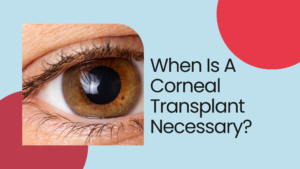Corneal Edema, popularly known as corneal swelling, is a condition where fluid accumulates at the cornea due to inflammation. The cornea is an important part of your eye responsible for regulating the amount of light that enters your eye, which in turn helps you focus properly.
Corneal Edema can clearly lead to blurry vision, which can be extremely irritating and requires proper diagnosis. The following article will provide insight into the causes of corneal swelling with symptoms and treatment you should be aware of.
Causes of corneal edema
There are multiple reasons for a person to suffer from corneal edema, one being Fuch’s dystrophy which is a hereditary condition. In this condition, endothelial cells that are responsible to pump liquid out of your cornea gradually lose their functionality over the years.
Another factor includes an immune response to herpes leading to inflammation called Endotheliitis. Certain drugs and medications can also induce corneal edema, which you must be mindful of. Especially the ones containing benzalkonium chloride and chlorhexidine can trigger Fuch’s dystrophy.
Other factors that may cause corneal swelling include:
- Accidents causing injury to the eye
- Exposure to poisonous substances causing irritation and damage
- Trauma after eye surgery, including surgeries done for cataracts
- When the eye pressure increases, causing glaucoma
- When epithelium multiplies as a result of Chandler’s syndrome
Symptoms of corneal edema
In order to know if you have corneal edema, identifying the symptoms is important. The most common symptoms are blurry eyes that suggest something is wrong with the cornea.
Other symptoms include:
- Eye burn and eye pain
- Eye tenderness and swelling
- Excessive irritation in the eye leading to itchiness.
- In certain cases, blisters could be seen, which could be extremely painful.
- Sensitivity to lights
- Blurry vision and halos around lights
Diagnosis of corneal edema
Under any circumstance, if you are facing the above symptoms that are an obvious indicator of corneal edema, you should visit an ophthalmologist in Mumbai. You will be asked about your medical history and visible symptoms. Upon confirmation, your doctor will proceed to:
- Check for visible cloudiness or scars in your cornea
- Use an ophthalmoscope on your eyes to get a detailed look
- Recommend an ultrasound to check for abnormalities
- Use pachymetry for corneal thickness estimation.
Corneal swelling treatment
Luckily for us, corneal edema does have a bunch of treatments that your doctor will help you with, depending on your situation. Some of the treatments that are commonly recommended are as follows:
- Eye irrigation is a process of flushing harmful chemicals from the eye. It is a process of washing your
eye with a saline solution to remove any form of substance that might harm your cornea.
-
Bandage contact lenses to prevent your cornea from further damage, and it helps soothe any form of scratch or blisters to the cornea.
-
Antibiotics are often recommended to treat any form of bacterial infection.
-
In case of severe corneal edema, surgery is recommended. A corneal transplant, either partial or total, is a common procedure to treat the condition.
-
In cases where edema is a result of an underlying medical condition, treating the same helps to ease the swelling.
-
Hypertonic solution and corticosteroid are used to reduce swelling.
-
Antiviral medications are also used to subdue the viral infection
What to expect after the treatment?
Much like any other disease and health condition, corneal edema also requires a specific time to recover after treatment. The duration may depend on the severity of the situation, and the type of treatment one has been through. In case of mild corneal swelling, you may not even see any symptoms, and it can heal without treatment.
The surgical procedures require a much longer time to heal, especially in cases where your cornea has been replaced. Expect some blurry visions for a year or so after getting a new cornea, as it requires time to settle in. Your doctor may recommend you use glasses if your vision is unclear.
Visit us today at Clear Vision Clinic if you are experiencing the symptoms of corneal edema. Headed by a cornea specialist in Mumbai, we are more than capable of handling your eyes with utmost care.




